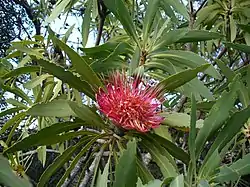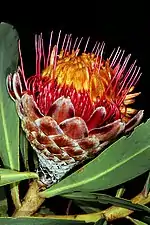| Blyde River protea | |
|---|---|
 | |
 | |
| habit and flower head | |
| Scientific classification | |
| Kingdom: | Plantae |
| Clade: | Tracheophytes |
| Clade: | Angiosperms |
| Clade: | Eudicots |
| Order: | Proteales |
| Family: | Proteaceae |
| Genus: | Protea |
| Species: | P. laetans |
| Binomial name | |
| Protea laetans L.E.Davidson | |
Protea laetans, the Blyde River protea or Blyde sugarbush, is a localized plant of the family Proteaceae. It was recognised as a species in 1970, and is endemic to the Blyde River Canyon of the Mpumalanga escarpment, South Africa.[2] The slender plants are up to 5m tall and flower from mid to late summer. The bracts of their closed flower heads are shiny and silvery in appearance.[2] They are most easily viewed near the F.H. Odendaal camp of the Blyde River Canyon Nature Reserve. Laetans means joyous, i.e. Blyde.
Gallery
 flower head
flower head flower head
flower head
References
Wikimedia Commons has media related to Protea laetans.
- ↑ Rebelo, A.G.; Mtshali, H.; von Staden, L.; Lötter, M.C. (2020). "Protea laetans". IUCN Red List of Threatened Species. 2020: e.T33931A185550218. doi:10.2305/IUCN.UK.2020-3.RLTS.T33931A185550218.en. Retrieved 15 November 2021.
- 1 2 Onderstall, Jo (1984). Transvaal lowveld and escarpment. South African wild flower guide. Vol. 4. Cape Town: Botanical Society of South Africa. p. 86. ISBN 0-620-07750-6.
This article is issued from Wikipedia. The text is licensed under Creative Commons - Attribution - Sharealike. Additional terms may apply for the media files.
